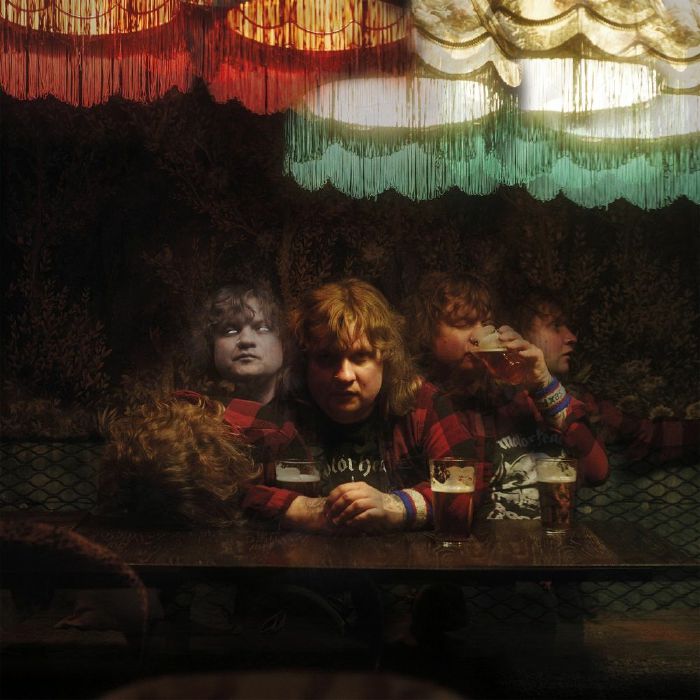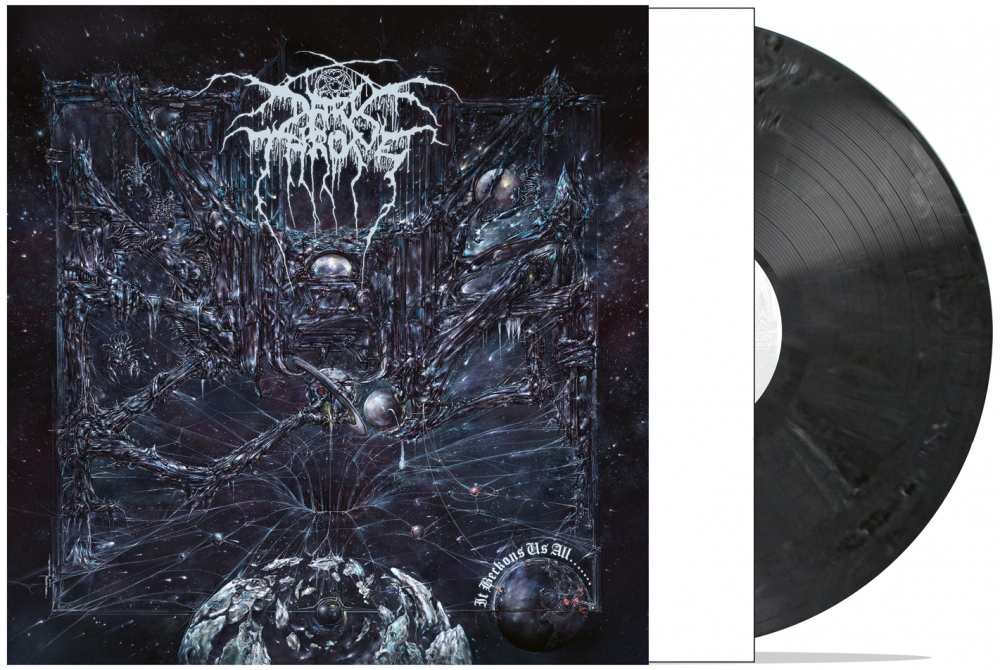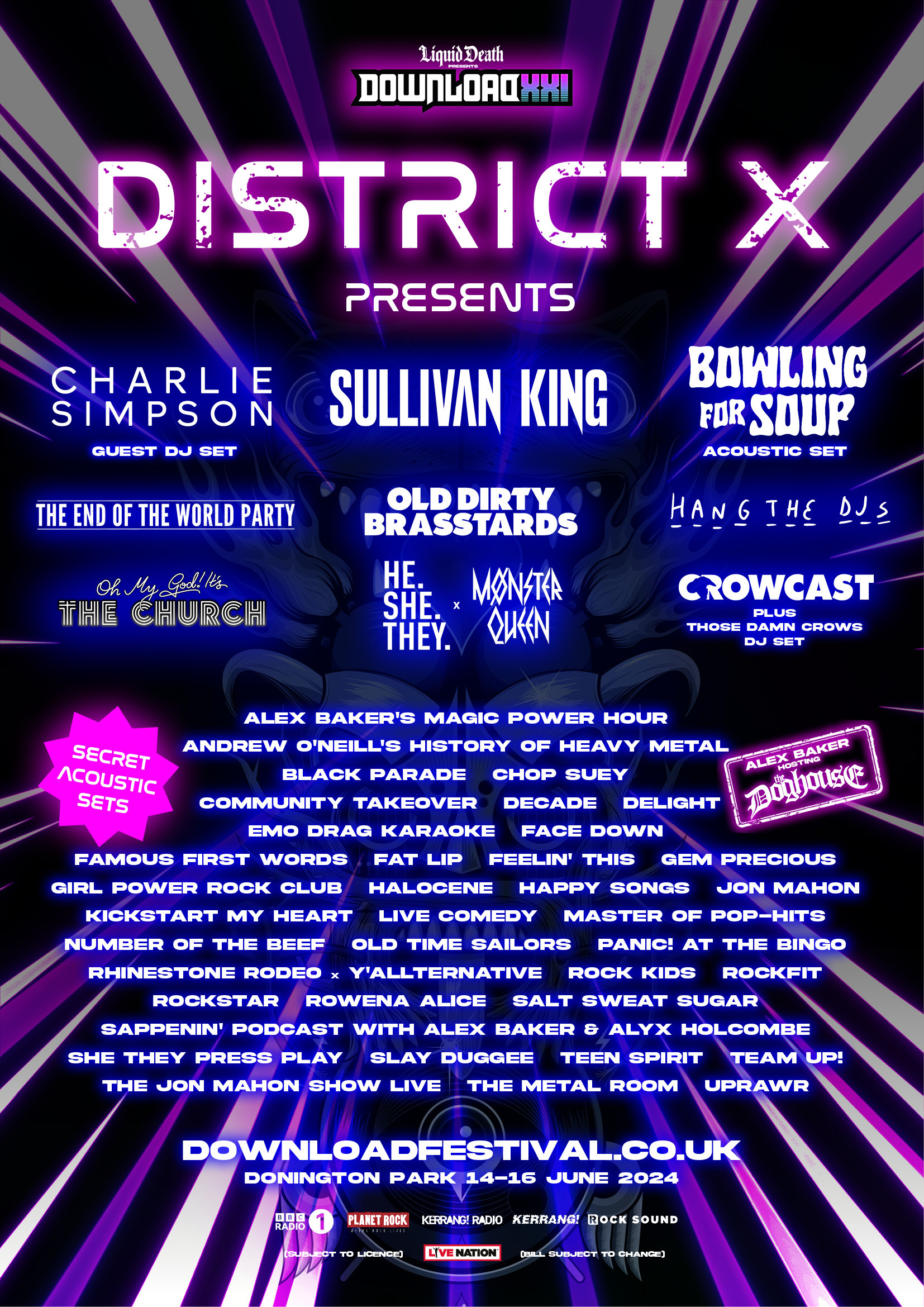Fronted by James Clark (Throw The Lights) and featuring members of Bullet for my Valentine, Still Remains and Threat Signal, Kill The Lights can lay legitimate claim to that most unfortunate of epithets – supergroup. Not that, from James’ demeanour, you would know this. Courteous and down to earth, we find him sitting comfortably in the sunny press area of Download, happy to go into detail as he answers our questions and frequently exhibiting a wry sense of humour.
Very much a collective with their own identity, Kill The Lights is much more than simply a “project featuring…” and this is, in no small part, down to James’ articulate and honest lyrics. As such, we focused on the challenges (and pressures) of writing with your heart on your sleeve.

Hi, how are you – have you been on site for long?
I’m good yeah, Well, we arrived Thursday and we were supposed to practise for a day or two, but we were having issues with equipment, so we didn’t come in until this morning. I heard the weather was pretty good, though.
It’s a nice change, normally we’re hip deep in mud!
Haha – It’s fucking terrible isn’t it?!
Ah, I don’t know, even the muddy years are fun, but it can get a bit much. Anyhow, thank you so much for taking this time to speak with me – it’s really cool to have this chance to catch up with you.
No worries.
My first question is to do with that universally hated title of the Super Group, because when you’ve got people who come together from existing bands, it creates a sense of expectation and I was wondering firstly how you came together and secondly, how you dealt with that?
Yeah, so, we always laugh because there was a lot of press early on talking about “super groups” and “featuring members of Bullet for my Valentine, Still Remains, Threat Signal, etc.” and I was always the “etc”! I was never listed as shit, so I can’t say “Super group” if I get “etc.” all the time [laughs]. But no, it’s one of those things. I think, initially, the most fearful thing was when we released the first single, because we didn’t know what people would think.
We got great feedback from the start for what we were trying to do and where we were going with it. It’s just been difficult, what with two years of the pandemic and the album coming out just after that. Yeah, but we’re excited to play today.
That’s been one of the challenges hasn’t it, because some bands have taken a more traditional approach to growth and others were already using social media a lot, but the pandemic forced a lot of artists into a position where they had to fall back on social media, either through lock down sessions or engagement with fans – how did you guys cope with it?
Yeah, again, our band is from different places, so we have to rely, not only on writing and recording that way, but also social media is a big thing in general. It was good to have that engagement – that platform allowed us to communicate and chat with fans, but at the same time it’s difficult with the fact that it was a shitty two years for most people and, if you’re a musician it was a really shitty two years, and it’s just nice to see people back at something a bit more normal.
I suppose that idea of throwing music back and forth, as a multi-national band, I guess you were better prepared than some?
Yeah, certainly the first album, we went back and forth while we were writing. And, probably about a year ago now, we all flew into Canada because that was the only place we could all meet. Moose and the guys couldn’t come into the US; we could go into Canada, so we all went to Canada for a week of writing, which was random but, you’ve got to do what you’ve got to do.
But, for us, we’ve always written that way. We’re pretty productive. We wrote twenty-something songs throughout the pandemic and we’re recording right now, so it set us up in a nice way to get ready for the new album.
Does that feed through into the way you record? Do you prefer to record live when it comes to actually tracking an album, or one at a time?
So, we do the recording all together. Demoing is when we’re traditionally separate. Everyone will add their pieces, and then I’ll get a finished song (or a finished structure of a song) and I’ll write notes and demo it out. It’s kind of worked for us, you know. In 2020 we had to do it that way anyway, but traditionally that’s how we’ve done it. We have been in a room and jammed and written some songs that way, but what seems to work for us is doing it from afar.
Looking at the interviews you’ve given in the past, you’ve talked about the flow of the album, and one of the things that stood out to me was the idea of sequencing the album like a live set – it’s a very challenging thing for a band, but it’s not often talked about, and yet it’s something bands often butt heads over – is that something you found?
It’s funny, we literally had a week – going back a month or so now. We thought it was going to take days, just to go through and it was actually about three hours and we agreed upon it. We listened through, started putting it into order and, like you say, for us it’s about going on a roller coaster – a journey – and I think a lot of true music fans listen for that. So, we do pay a lot of attention to that and hopefully we’ve got that again on this album, where you’re taken through an experience, versus two decent songs and a lot of shit, so that’s kind of the aim for this.
We feel like this this second album is going to beat the first album. It’s got some different shapes on it. Nothing that different stylistically, but we kind of stretch everything in different places, so we’re not just repeating the same pattern, so we’re excited about that.
One of the things I really enjoy is that it’s heavy, but there’s that dynamic there and you can pull things back, so that when you kick back in it feels a lot heavier, which is that live set dynamic again.
Until about two months ago, we felt like we were missing just a couple of songs, so we had a meeting and we did a writing session in Minneapolis, and we wrote the opening song and the last song on the album, so it was kind of cool just to finish it off. It was close, but we were missing that sense of a journey, so we found it and it was good.
Lyrically, it seems very positive, in terms of its outlook, but it deals with negativity – that old blues approach of taking something difficult and making it positive and relatable; how involved are the band in discussing themes and issues in the music.
Traditionally I write all the lyrics. I think for us… for me, for us and, I think for a lot of people, the pandemic was very difficult for the mental health of everybody and that’s what I touched on in the first album and the second album goes even more deeply into struggles and anxiety and depression and all of those kinds of things too.
To be honest, I’ve always tried to be as real as possible and as honest as possible, you know, and I struggle with anxiety and I think people relate to that when you’re trying to be honest about it.
Yeah, I agree, but also, as a lyric writer, it’s very powerful, and difficult as well, to be so vulnerable and open on the page – are you someone who fills notebooks and then narrows it down to something that you feel comfortable sharing?
Yeah, I mean a lot of it… the way I write is that I’ll have the song in front of me and I’ll listen to the whole song like a hundred and fifty times and that’s where I capture the melody and I try to have key words or themes. That’s what I start with and it evolves from there. A lot of it is also the emotion I am feeling at the time too, so I try to mix it up a bit, but a lot of it is really the life I’m living and what it is what it is – I can’t deviate too far from that, because it just wouldn’t be me.
But, at the same time, there is that need to make it relatable and, for me at least, taking the personal and making it relatable is a challenging thing to do and a brave thing to do – do you think about it from an outside perspective at all? Do you take a step back, or is it more of a stream of consciousness type of thing?
It’s more of a stream of consciousness, really. I don’t over-analyse it, but it’s a snapshot of where I am at that time. It was a dark couple of years, right. There are some different conversation pieces there, going on around relational / relationships, but thematically it’s in the same vein as the first album.

The final question I have about this, I think one of the big shifts in music is that a lot of bands were very much larger than life and they lived a life that the fans, for the most part, could never possibly live. Now, there are artists who are more open and more vulnerable and taking that stance and being role models – do you ever think about that as a responsibility?
Yeah, because I think back to when I was thirteen years old and the impression it makes. I think about the impact that music can have, you know. I think that a lot of people – kids, teens, adults – we all deal with the same shit and I think that a lot of times the rock ‘n’ roll thing was to pretend everything was perfect when it’s not, a lot of people have addiction issues, and all the things that come with that. I think a lot of it is just being about transparent and sharing the fact that we all go through the same stuff and the same struggles, and I think that kids relate to that. If I can help ten kids across the world – they listen to what I do and are impacted in a positive way after that. You know, if they get help or do what they need to do, I feel we’ve kind of won there, so I hope it’s a lot more than that, but I think there is an important place for that.
And I’m guessing through social media, you can maybe here or see some of that – do you get people writing to you?
Yeah, it’s great. You know, we’ve done some live sessions and stuff too, and we’ve seen the fan feedback on there when we’re doing it live and I totally relate to it. Yeah, I think it’s good. I definitely want to get involved with the anti-suicide programmes that help teens out, I think that could be a very impactful thing to be involved with. I’ve done it in the past and, hopefully, in the future I can do it again.
So, yeah, in the final analysis, it’s catharsis, which is powerful for you and for the fans, and there’s something you can share there.
Yeah, I think it’s just… it’s amazing for people to be singing those lyrics – after two years where we’ve been shut down and they’ve got the t shirt on and they know every damn lyric, that’s pretty damn good and you know you’ve made an impact if that’s the case.
Thank you so much – do you have any final words?
I grew up in England, I’ve been in America for twenty years and it’s a dream to play at Download, so I’m pretty dam pumped. We were supposed to play the last two years, and this is the third time lucky. Obviously, my whole family are still in the UK and there’s a bunch of them here today and I’m excited to get out and rock it.










Leave a Reply